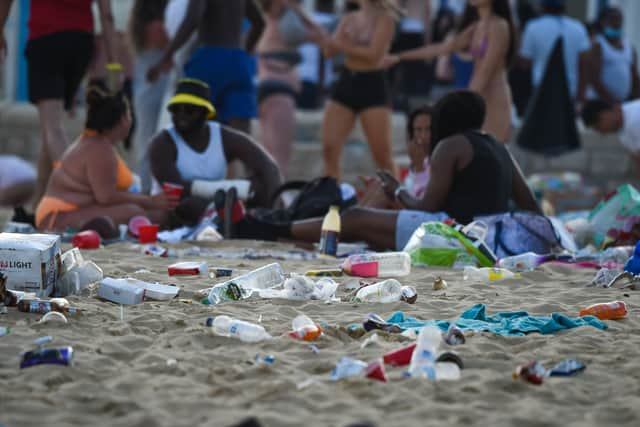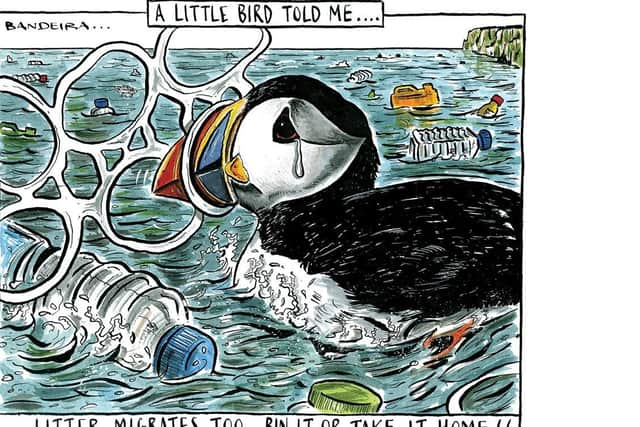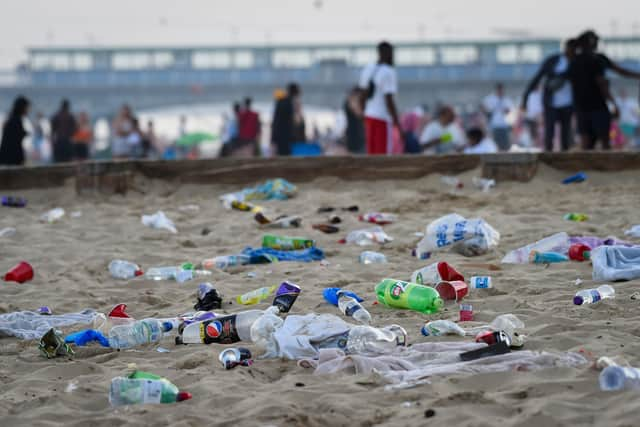Unmasked: the facemask litter epidemic now putting Britain to shame – Andrew Vine
It’s the pale blue disposable facemasks so many of us are wearing to the shops or on public transport, discarded without a thought to pollute paths, woods and hedgerows, fluttering from branches and bushes like pennants of a society that doesn’t give a monkey’s.
Over the past couple of weeks, I’ve noticed them on the coastal path between Bempton and Thornwick Bay, some caught on cliffs where the seabirds nest, on a path around the Hole of Horcum, between Pickering and Whitby, and above Bolton Abbey.
Advertisement
Hide AdAdvertisement
Hide AdAll wild and beautiful places that should not be disfigured by the litter of visitors who can’t be bothered to take their rubbish home with them.


Everyone out and about in Yorkshire’s glorious landscapes will have a similar tale to tell, and know the same sinking feeling at seeing them abused in this way.
Facemasks are rapidly becoming the environmental menace that single-use supermarket carrier bags once were.
Like many others, I rejoiced when a charge was introduced for them and, as a result, the amount flapping about showed a sharp and welcome decline.
Advertisement
Hide AdAdvertisement
Hide AdBut now masks are there instead, out of reach of being collected, their elasticated ear-loops anchoring them to cliffs or treetops for so many years to come that by the time they rot away the requirement to cover our faces will probably have faded into an unpleasant memory.


Why anyone would choose to wear a mask while out in the fresh air of the hills or clifftop path where there are no crowds is a mystery to me, but so is the mentality that just chucks them without a thought.
It isn’t just the countryside. Signs have gone up at the park near my home urging people not to harm it by dropping litter, which given there is a bin every 20 yards along all its paths, means there really is no excuse.
But still, as the staff arrive every day, there is more rubbish to collect. One I know well despairs. Virtually every time we stop to chat, he’s lugging a bin liner full of litter, with the tell-tale blue of facemasks poking out between the tie-handles.
Advertisement
Hide AdAdvertisement
Hide AdThe number of these things in circulation is mind-boggling. It’s estimated that worldwide, 194bn plastic masks and gloves are in use every month. And where are too many of them going afterwards?


Keep Britain Tidy had the beginnings of a dismaying answer this week when it reported finding discarded masks and gloves at 200 of 2,000 sites it surveyed, and warned of a coming tide of plastic waste.
What a menace it poses will be underlined by a BBC1 documentary on Tuesday, War On Plastic: The Fight Goes On, presented by Hugh Fearnley-Whittingstall and Anita Rani, which features upsetting footage of an octopus emerging from beneath a disposable facemask on the ocean floor.
We should be no less upset by their alien presence in Yorkshire’s landscapes and places of recreation, and no less determined to do something about it.
Advertisement
Hide AdAdvertisement
Hide AdThis Bank Holiday weekend, certain to be busy at the seaside, in the Dales and on the North York Moors, brings with it the prospect that the volume of litter will shoot up.


We’ve long had an ever-worsening problem with litter in our country anyway. A throwaway culture, whether it be coffee cups or the wrapping from burger and chips, combined with an ingrained, yobbish, laziness on the part of some who can’t be bothered to find a bin, leaves town and country alike under a layer of waste.
But the masks or gloves being worn in their tens of millions are giving it a whole new dimension that demands action. And challenging those who drop litter to pick it up and dispose of it properly can be tricky, even when done politely. I’ve tried this on occasion, and the reaction divides roughly 50-50 between the shame-faced and the abusive, so that’s a course of action to be embarked on with caution.
Better by far is to mobilise the young, who none of us want to inherit landscapes choked by rubbish.
Advertisement
Hide AdAdvertisement
Hide AdA generation inspired by the teenage climate activist Greta Thunberg are the perfect foot-soldiers in the battle to keep the places where we live or go to soak up nature’s glories as pristine as they should be.
These children are leading by example, already pressuring their parents into being as environmentally-friendly as possible, and that message will be embraced more wholeheartedly and widely with each passing year.
Somehow, we’ve got to make dropping litter so socially unacceptable, so widely frowned upon, that peer pressure drills it into people’s heads that it’s just plain wrong and simply should not happen. It’s the same process that has brought down the numbers of those who drink and drive to a fraction of what they once were.


But such social change will take time, when action against the detritus of coronavirus needs to be taken now.
Advertisement
Hide AdAdvertisement
Hide AdAnd that means bringing it into the national effort against the virus as part of the public information campaigns run by the Government.
Britain’s people have heeded everything they have been urged to do. We washed our hands more often and then stayed at home. We socially distanced and then wore face coverings.
We ventured out to eat at a discount in order to help pubs and restaurants stay open. And now we’re watching our weight and trying to get fitter, all because we’ve been asked to do our bit to help.
So how about mobilising the nation to stem the horrible, damaging tide of waste by disposing of our masks and gloves responsibly? The public is in a mood to listen, and the prize is saving our green and lovely land.
Read Andrew Vine in The Yorkshire Post every Tuesday.
Support The Yorkshire Post and become a subscriber today.
Advertisement
Hide AdAdvertisement
Hide AdYour subscription will help us to continue to bring quality news to the people of Yorkshire. In return, you’ll see fewer ads on site, get free access to our app and receive exclusive members-only offers.
So, please - if you can - pay for our work. Just £5 per month is the starting point. If you think that which we are trying to achieve is worth more, you can pay us what you think we are worth. By doing so, you will be investing in something that is becoming increasingly rare. Independent journalism that cares less about right and left and more about right and wrong. Journalism you can trust.
Thank you
James Mitchinson
Editor
Comment Guidelines
National World encourages reader discussion on our stories. User feedback, insights and back-and-forth exchanges add a rich layer of context to reporting. Please review our Community Guidelines before commenting.